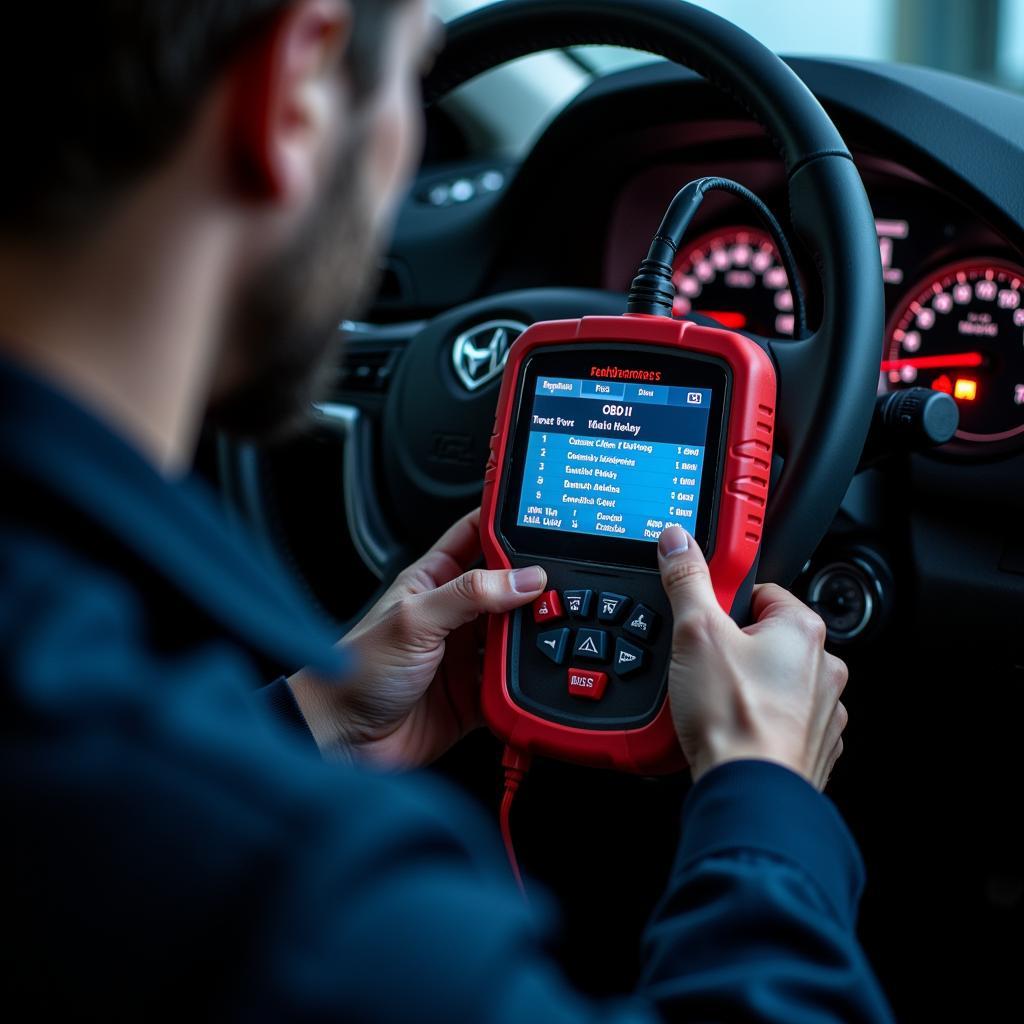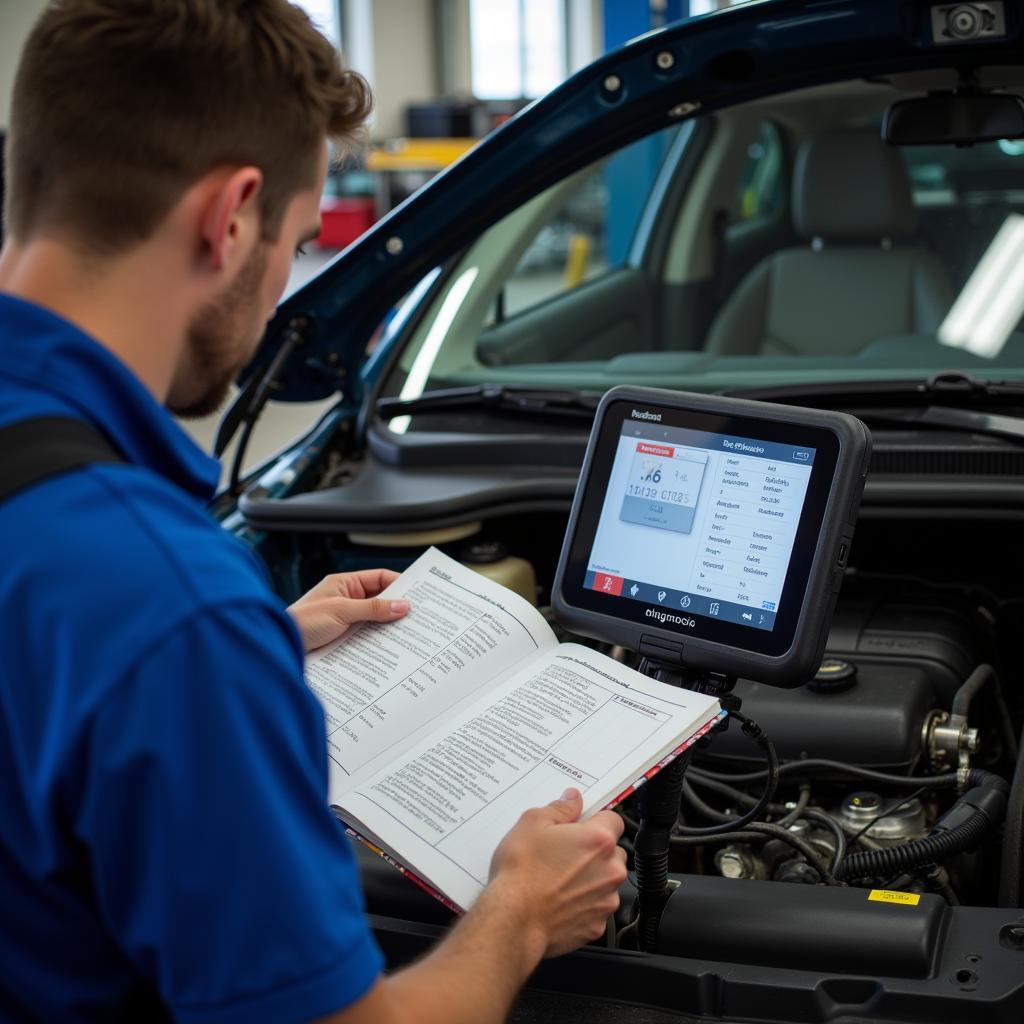Car diagnostics have revolutionized the way we identify and troubleshoot vehicle issues. A question often arises: Will Car Diagnostic Tell You what’s wrong? While not always a definitive answer, car diagnostic tools provide invaluable insights into your vehicle’s health, often pinpointing the root cause of problems. Let’s delve deeper into what car diagnostics can and cannot reveal.
Unraveling the Enigma: How Car Diagnostic Tools Work
Modern vehicles are equipped with intricate computer systems, constantly monitoring various components and functions. These systems generate Diagnostic Trouble Codes (DTCs) when anomalies are detected, acting as digital breadcrumbs leading to the source of the issue. Car diagnostic tools serve as the decoder rings, accessing and translating these DTCs into understandable information for mechanics and vehicle owners.
 Car Diagnostic Tool in Action
Car Diagnostic Tool in Action
What Car Diagnostics Can Tell You
Car diagnostic tools offer a wealth of information about your vehicle’s health, including:
- Engine Performance: Diagnostics can pinpoint issues related to fuel delivery, air intake, ignition timing, and emissions control, often signaling problems with spark plugs, oxygen sensors, or the catalytic converter.
- Transmission Health: By analyzing data from the transmission control module, diagnostics can reveal issues with gear shifting, clutch operation, or fluid pressure.
- Brake System: Diagnostic tools can identify problems with the ABS system, brake fluid levels, and brake pedal position sensors, ensuring optimal braking performance.
- Electronic Systems: From airbag control modules to power window systems, car diagnostics can pinpoint faults in various electronic components, often revealing issues with wiring, sensors, or control modules.
Limitations of Car Diagnostic Tools
While car diagnostic tools are powerful allies in troubleshooting, it’s important to remember they don’t possess magical all-knowing abilities.
- Symptoms, Not Solutions: Diagnostic tools primarily identify symptoms, not the root cause. For instance, a “lean fuel mixture” code might indicate a vacuum leak, faulty fuel injector, or a problem with the oxygen sensor. Further investigation is often necessary to pinpoint the exact culprit.
- Mechanical Problems: Diagnostics excel in detecting electronic and sensor-related issues but might miss purely mechanical problems like worn-out brake pads, failing water pumps, or a slipping timing belt.
- Code Interpretation: While DTCs provide valuable clues, interpreting them accurately requires knowledge and experience. Different vehicle makes and models might use slightly different codes for similar issues, and a single underlying problem can trigger multiple error codes.
 Mechanic Analyzing Diagnostic Results
Mechanic Analyzing Diagnostic Results
Maximizing the Benefits of Car Diagnostics
To leverage the full potential of car diagnostics:
- Regular Check-Ups: Periodic diagnostic scans can detect minor issues before they escalate into major problems, saving you time, money, and potential headaches.
- Experienced Professionals: Consult qualified mechanics familiar with your vehicle’s make and model to accurately interpret diagnostic codes and recommend appropriate repairs.
- Combined Approach: Remember, diagnostics are just one tool in the arsenal. A thorough visual inspection, coupled with a test drive and your input regarding symptoms, helps mechanics paint a complete picture of the vehicle’s condition.
Conclusion: Car Diagnostics: Your Vehicle’s Advocate
Car diagnostic tools are powerful allies in maintaining your vehicle’s health, providing invaluable insights into potential issues. However, they are not a substitute for a skilled mechanic’s expertise. By combining diagnostic information with a comprehensive approach to troubleshooting, you can ensure your vehicle remains in top condition for years to come.
Remember, will car diagnostics tell you what’s wrong? The answer is: it depends. However, the information provided offers an invaluable starting point for diagnosis and repair, making car diagnostics an essential tool for any vehicle owner or mechanic.
Need assistance with car diagnostics or vehicle troubleshooting? Contact our expert team via WhatsApp: +1(641)206-8880, or email us at [email protected]. We’re available 24/7 to answer your questions and guide you through any automotive challenges you might face.

Leave a Reply